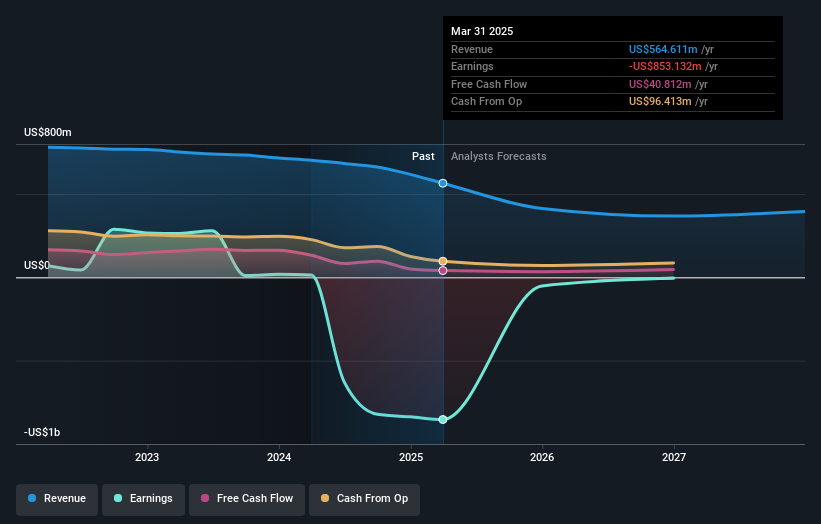
As you might know, Chegg, Inc. (NYSE:CHGG) just kicked off its latest first-quarter results with some very strong numbers. Revenues and losses per share were both better than expected, with revenues of US$121m leading estimates by 5.9%. Statutory losses were smaller than the analystsexpected, coming in at US$0.17 per share. Earnings are an important time for investors, as they can track a company's performance, look at what the analysts are forecasting for next year, and see if there's been a change in sentiment towards the company. Readers will be glad to know we've aggregated the latest statutory forecasts to see whether the analysts have changed their mind on Chegg after the latest results.

Taking into account the latest results, the five analysts covering Chegg provided consensus estimates of US$413.5m revenue in 2025, which would reflect a painful 27% decline over the past 12 months. The loss per share is expected to greatly reduce in the near future, narrowing 92% to US$0.63. Before this latest report, the consensus had been expecting revenues of US$433.3m and US$0.63 per share in losses.
See our latest analysis for Chegg
The average price target fell 25% to US$0.82, with the analysts clearly concerned about the weaker revenue outlook and expectation of ongoing losses. The consensus price target is just an average of individual analyst targets, so - it could be handy to see how wide the range of underlying estimates is. The most optimistic Chegg analyst has a price target of US$1.00 per share, while the most pessimistic values it at US$0.65. These price targets show that analysts do have some differing views on the business, but the estimates do not vary enough to suggest to us that some are betting on wild success or utter failure.
One way to get more context on these forecasts is to look at how they compare to both past performance, and how other companies in the same industry are performing. These estimates imply that revenue is expected to slow, with a forecast annualised decline of 34% by the end of 2025. This indicates a significant reduction from annual growth of 2.0% over the last five years. By contrast, our data suggests that other companies (with analyst coverage) in the same industry are forecast to see their revenue grow 11% annually for the foreseeable future. So although its revenues are forecast to shrink, this cloud does not come with a silver lining - Chegg is expected to lag the wider industry.
The Bottom Line
The most obvious conclusion is that the analysts made no changes to their forecasts for a loss next year. On the negative side, they also downgraded their revenue estimates, and forecasts imply they will perform worse than the wider industry. Furthermore, the analysts also cut their price targets, suggesting that the latest news has led to greater pessimism about the intrinsic value of the business.
Following on from that line of thought, we think that the long-term prospects of the business are much more relevant than next year's earnings. We have estimates - from multiple Chegg analysts - going out to 2027, and you can see them free on our platform here.
You should always think about risks though. Case in point, we've spotted 3 warning signs for Chegg you should be aware of.
Have feedback on this article? Concerned about the content? Get in touch with us directly. Alternatively, email editorial-team (at) simplywallst.com.
This article by Simply Wall St is general in nature. We provide commentary based on historical data and analyst forecasts only using an unbiased methodology and our articles are not intended to be financial advice. It does not constitute a recommendation to buy or sell any stock, and does not take account of your objectives, or your financial situation. We aim to bring you long-term focused analysis driven by fundamental data. Note that our analysis may not factor in the latest price-sensitive company announcements or qualitative material. Simply Wall St has no position in any stocks mentioned.